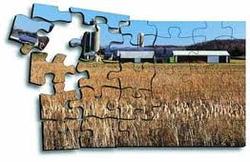DTN/The Progressive Farmer (USA) | 20 May 2013
Foreign Ownership Ban Retained
Marcia Zarley Taylor DTN Executive Editor
Wisconsin state legislators have blocked an effort by Gov. Scott Walker to lift the state's long-time limits on foreign ownership of farmland, legislative staffers and lobbyists tell DTN.
Legislators objected on the grounds that the governor's budget bill was no place for a farmland ownership debate. But with pension funds and other institutional owners eager to pour billions of dollars into Corn Belt real estate markets, the controversy could easily resurface. Kansas legislators also considered a revision to its corporate farming ban this year as well.
In February, Walker proposed repealing Chapter 710 of the Wisconsin Statute that bans foreign corporations and foreign individuals who are not U.S. residents from owning more than 640 acres of Wisconsin land. In effect, that would lift acreage limits on nonresident aliens and corporations--and formally welcome major farmland investors like pension and mutual funds.
The Farmland Investment Letter reported that Croatian companies had requested their embassy seek the repeal (www.farmlandinvestorcenter.com), although institutional owners like TIAA-CREF or UBS AgriVest would be major beneficiaries. The Wisconsin Realtors Association backed the proposal.
Since 2009, TIAA-CREF has invested at least $21.2 million in 3,562 acres of cranberry bogs and row-crop land in Adams, Portage and Price counties, the newsletter reported. In December 2012, UBS AgriVest purchased 9,965 acres of Wisconsin farmland for $67.5 million from investor Ray Eckstein. AgriVest's 7-year-old private real estate investment trust had been buying large chunks of farmland in the Mississippi Delta, Rocky Mountain states, Georgia and Wisconsin. Its 27 investors are mostly pension funds, the paper reported.
But how such sizable purchases sidestepped Chapter 182, the separate state statute barring any corporate ownership of farmland, mystifies some Wisconsin farm interests. "I don’t know how they got around it," Kara Slaughter of the Wisconsin Farmers Union tells DTN. "The problem is, no state agency is responsible for watching."
Given the size of the AgriVest transaction, Farmers Union is concerned about the issue, she adds. "The price of land is the single biggest impediment to young farmers getting into farming, so well heeled investors buying up prime farmland is a real concern." Until the stock market's recent rally, institutional investors were running out of places to put their money. Midwest farmland's double-digit returns look appealing next to stocks, other securities or even euros, she says.
Wisconsin is among eight Corn Belt states still banning nonfamily corporate ownership of farmland. But since December 2006, when an 8th Circuit Court of Appeals ruled against Nebraska’s corporate farming ban, all of the states with farmland ownership limits remain vulnerable, according to legal expert like Iowa State University law professors emeritus Neil Harl.
States which still impose some limits on corporate farmland ownership include Wisconsin, Iowa, Oklahoma, Kansas, Minnesota, Missouri, North Dakota and South Dakota. Together they represent a third of the nation's row crop farmland and represent some of the country's most productive soils.
Foreign Ownership Ban Retained
Marcia Zarley Taylor DTN Executive Editor
Wisconsin state legislators have blocked an effort by Gov. Scott Walker to lift the state's long-time limits on foreign ownership of farmland, legislative staffers and lobbyists tell DTN.
Legislators objected on the grounds that the governor's budget bill was no place for a farmland ownership debate. But with pension funds and other institutional owners eager to pour billions of dollars into Corn Belt real estate markets, the controversy could easily resurface. Kansas legislators also considered a revision to its corporate farming ban this year as well.
In February, Walker proposed repealing Chapter 710 of the Wisconsin Statute that bans foreign corporations and foreign individuals who are not U.S. residents from owning more than 640 acres of Wisconsin land. In effect, that would lift acreage limits on nonresident aliens and corporations--and formally welcome major farmland investors like pension and mutual funds.
The Farmland Investment Letter reported that Croatian companies had requested their embassy seek the repeal (www.farmlandinvestorcenter.com), although institutional owners like TIAA-CREF or UBS AgriVest would be major beneficiaries. The Wisconsin Realtors Association backed the proposal.
Since 2009, TIAA-CREF has invested at least $21.2 million in 3,562 acres of cranberry bogs and row-crop land in Adams, Portage and Price counties, the newsletter reported. In December 2012, UBS AgriVest purchased 9,965 acres of Wisconsin farmland for $67.5 million from investor Ray Eckstein. AgriVest's 7-year-old private real estate investment trust had been buying large chunks of farmland in the Mississippi Delta, Rocky Mountain states, Georgia and Wisconsin. Its 27 investors are mostly pension funds, the paper reported.
But how such sizable purchases sidestepped Chapter 182, the separate state statute barring any corporate ownership of farmland, mystifies some Wisconsin farm interests. "I don’t know how they got around it," Kara Slaughter of the Wisconsin Farmers Union tells DTN. "The problem is, no state agency is responsible for watching."
Given the size of the AgriVest transaction, Farmers Union is concerned about the issue, she adds. "The price of land is the single biggest impediment to young farmers getting into farming, so well heeled investors buying up prime farmland is a real concern." Until the stock market's recent rally, institutional investors were running out of places to put their money. Midwest farmland's double-digit returns look appealing next to stocks, other securities or even euros, she says.
Wisconsin is among eight Corn Belt states still banning nonfamily corporate ownership of farmland. But since December 2006, when an 8th Circuit Court of Appeals ruled against Nebraska’s corporate farming ban, all of the states with farmland ownership limits remain vulnerable, according to legal expert like Iowa State University law professors emeritus Neil Harl.
States which still impose some limits on corporate farmland ownership include Wisconsin, Iowa, Oklahoma, Kansas, Minnesota, Missouri, North Dakota and South Dakota. Together they represent a third of the nation's row crop farmland and represent some of the country's most productive soils.












